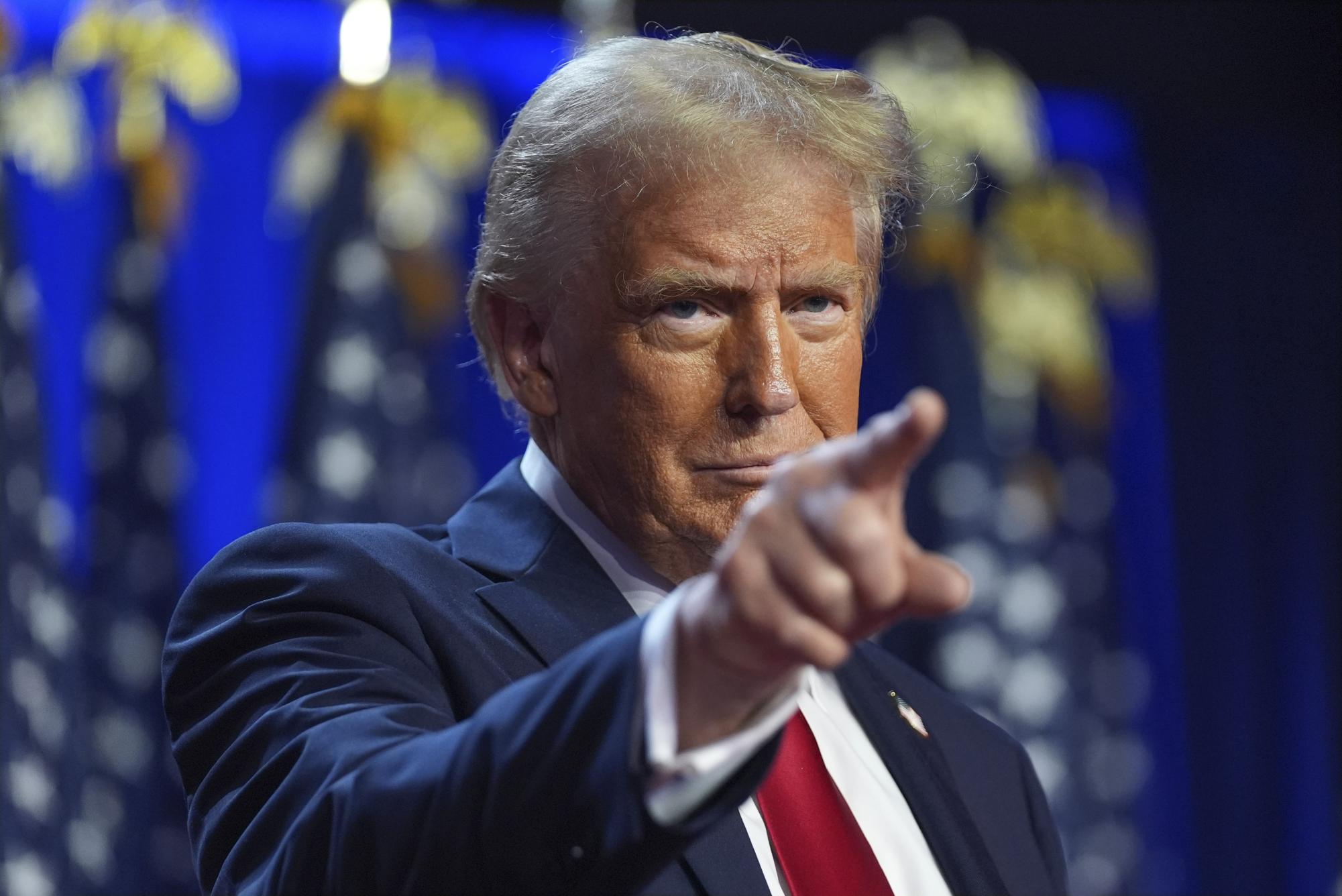A look into Trump’s policies as the 47th president of the United States


Republican presidential nominee former President Donald Trump arrives at an election night watch party at the Palm Beach Convention Center, Wednesday, Nov. 6, 2024, in West Palm Beach, Fl.
In the early hours of Wednesday, Nov. 6, former president Donald Trump was elected the 47th President of the United States. In the next four years, he intends to enact and influence policy on the economy, immigration, abortion policy, energy and climate change — many of which affect the state of Pennsylvania directly.
Trump has vowed that on day one of his presidency, he will deport millions of illegal immigrants living in the US. He promised more direct action on the first day of his second presidency, including pardoning January 6th rioters, stopping offshore wind energy and expanding executive powers.
The economy is the most important issue in Pennsylvania according to an Emerson survey where 52% of Americans put economic policies first. Trump plans to extend his 2017 Tax Cuts and Jobs Act and lift the State and Local Tax Cap, exempt overtime pay, tips, and social security from being taxed, reduce the corporate tax rate from 21% to 15% and enact a new 20% tariff on imported goods with a 60% tariff on Chinese goods.
Josh Minsky, junior neuroscience major and president of the College Republicans at Pitt, agreed with Trump’s economic plans. Minsky emphasized the importance of the growth in American-owned businesses.
“Decreasing regulations across the board and cutting taxes [would allow] for more money in people’s pockets and a friendlier environment for business and innovation,” Minsky said.
Inflation, specifically, is the most pressing issue in Pennsylvania over every other state. To combat inflation, Trump plans to end certain federal drilling permits and expedite the approval process of natural gas pipelines to Marcellus Shale, an important natural gas resource, in Pennsylvania, Washington and New York.
Fracking has a large presence in Pennsylvania, with 220,175 reported drilled and proposed fracking wells. Fracking also helped reduce energy costs and increase jobs in Pennsylvania.
Trump pledged for Pennsylvanian workers to be “pumping, fracking, drilling and producing like never before.”
Evidence suggests that fracking in Pennsylvania contributes to high levels of pollution. Pittsburgh is greatly impacted by the environmental effects of fracking, with a study from the University of Pittsburgh linking the gas industry to certain health problems, including asthma and lymphoma, in areas of Southwest Pennsylvania near drilling sites.
Along with his vow to boost oil production in America, Trump also promised more than twenty oil company executives that he would roll back Biden’s environmental regulations, seeking, in return, $1 billion towards his 2024 presidential re-election campaign.
During Trump’s first presidency, he pulled out of the Paris Agreement — the international initiative to keep the increase in global temperature below two degrees celsius — and plans to do the same in his forthcoming presidency.
Another continuing stance from Trump’s first presidency is his anti-immigrant rhetoric. Incoming vice president J.D. Vance attributes the current housing crisis in the US and the rising cost of living on an influx of immigration.
Trump’s policies on immigration include sending military troops to the U.S. border, permitting Immigration and Customs Enforcement (ICE) raids of workplaces, denying due process to undocumented immigrants and using the military and the National Guard to deport unauthorized migrants.
Under Trump’s first presidency, many Americans worried about access to reproductive rights. In the 2024 election, abortion rights were the second most pressing issue in PA.
During his first presidency, Trump appointed three Supreme Court justices – Neil Gorsuch, Brett Kavanaugh and Amy Coney Barrett – who formed a part of the majority overturning Roe V. Wade, giving the power to determine the legality of abortion back to the states. Trump has promised to veto any proposed federal abortion ban, maintaining his stance on individual states regulating reproductive rights.
Throughout the year, the Israel-Hamas war has been a conflicting topic in American policy, sparking protests across the nation — including multiple on Pitt’s campus.
At the Israel-American Council Summit in October, Trump said he was a “big protector” of Israel. During his first term as president, he recognized Israel’s annexation of the Golan Heights and also recognized Jerusalem as the country’s capital.
Minsky commented on what he believes Trump’s actions towards Israel will constitute during his second term of presidency.
“Israel will be given the green light to end the war in Gaza using the necessary force required to do so,” Minsky said. “Without constant threats of cutting off weapon shipments and letting in an unspecified level of aid.”
Trump’s policies greatly differ from former presidential candidate, Vice President Kamala Harris, as she aimed to empower working and middle class Americans, protect women’s reproductive rights and restore Roe v. Wade amongst other policies. Some Americans worry about the Heritage Foundation’s conservative “Project 2025” agenda, despite the Trump campaign denying any relation to actual plans.
Trump is the second president in U.S. history to serve in non-consecutive terms, following 19th-century president Grover Cleveland. He is the first president to have been indicted and convicted of felony charges.
Recent Posts
Therese Pitman: Giving back to Pitt’s student-athletes with equality
Pitman is Pitt’s Director of Student Athlete Development where she helps student-athletes navigate their career…
Pitt speech and debate team heads to nationals
The William Pitt Debating Union, Pitt’s speech and debate team, sends students to both in-person…
Visuals: A Year in Review
The visuals desk had an interesting year. In the midst of the 2024 Presidential Election,…
De-stress events across campus offer students a break from studying
During finals week, departments across campus are offering wellness events to help students manage stress…
Pitt students share their summer plans
After a long and strenuous academic year, many students are excited to take a break.…
Column | Collaboration and connection make us better — yes, even in journalism
Today is the last day I will ever do this, and despite the amount of…

